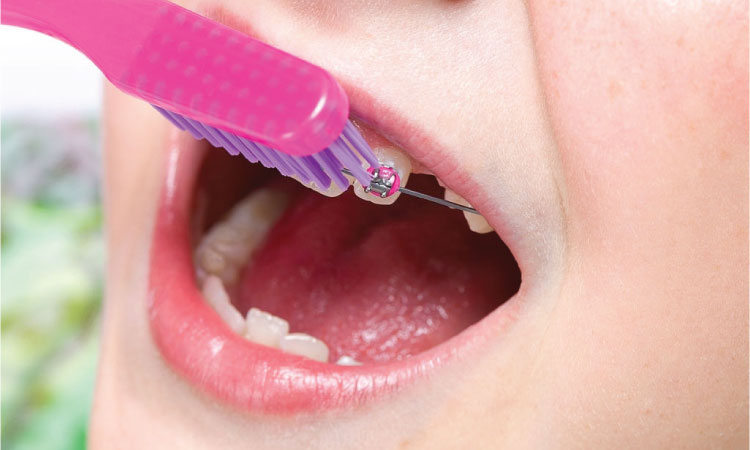My child almost always had his thumb in his mouth when young. And not for some apparent reasons, but probably when he was bored, or had nothing better to do. Infact, he wouldn’t sleep without sucking on his thumb for a few minutes. And, trust me, I wasn’t alone battling this habit of my baby chewing his thumb every now and then.
Thumb sucking is not a rare habit among babies. Infact, babies start to suck on their thumb while still in the womb. However, at some point, you might wonder how to stop the baby from chewing thump – given hygiene and other concerns. Thumb sucking is one of those habits which can be very tricky to break.
We all want our babies to grow up healthy without getting addicted to any practice or behaviour that would stand in the way of their healthy development or have any long term consequences.

Many parents feel concerned about their baby’s thumb chewing habit. This is because prolonged thumb sucking habit can bring about many long-lasting negative side effects.
Malocclusion of teeth is one of the most important side effects of thumb sucking in babies. It might also adversely affect your child’s jaw development, thereby misaligning the permanent teeth.
When Do Babies Start Sucking Their Thumb?
Well, each baby differs. Some babies get into the habit of thumb sucking only a few months after birth. This is only after start gaining better control over their arms and hands. However, some babies discover their thumb within weeks of birth.
What’s more, for some newborns sucking thumb is nothing but an extension of a habit they mastered while still in the womb. You can find ‘n’ number of ultrasound pictures of the little ones sucking their thumbs in the womb. They perfect the art before birth!
The urge to suck the thumb is found to be strongest during the first six months of baby. This impulse usually starts to decline after the age of 6 months. However, many babies continue their thumb-sucking habit until they turn one, or even 2 and 3.
Related Reading: 9 Early Signs Of Intelligence In Babies
However, after one year, as the baby finds more ways to engage themselves, the rate of this habit is found to be decreased markedly. In fact, only 6% of babies continue this habit past one year. Sometimes, baby tend to chew on their thumbs even when they are 4 years old. Now let us see why babies chew their thumb.
Why Do Babies Suck Their Thumb
For a baby, thumb sucking is quite natural, and you can even count it as a developmental milestone. Your baby is learning hand mouth coordination. Maybe the habit starts as an accident. But soon the baby learns to take his hand to his mouth whenever he feels like.
Babies have a natural desire to suck. As mentioned early, many of them start it when they are in their mother’s womb. As babies grow, they might start to suck on their whole fist or even their toes.
You can consider the baby’s urge to suck their thumb as a newborn’s reflex. After all, that is how they eat for the first six months of their life. Babies usually suck their thumb when they are hungry, sleepy, tired, or as a means of self soothing.
Sucking the thumb is also a means for babies to soothe their sore gums during the teething phase. Gradually, as the babies grow, chewing thumb can be a means to calm themself when they are scared. Toddlers often comfort themselves by sucking on their thumbs
You might have noticed your little one’s habit of thumb sucking intensifies when you take him to a public function. Yes, babies are scared of the sudden change in their surroundings, and they are not at all happy with strangers.
For some of them, chewing thumbs are a means of entertainment when they get bored. Some babies prefer thumbs to the breast as a means of the soothing or as sleeping pacifier. However, habitual sucking can be hard on the skin of the baby’s thumb.
Possible Side Effects Of Thumb Sucking In Babies

Basically, chewing thumb is just a soothing means for infants. And as an infant’s mother, you don’t have to worry too much about it. However, if the habit continues into toddlerhood, it can bring about various issues like:
1. Broken skin
Baby’s skin is soft and supple. Aggressive and constant thumb sucking can alter the texture of the skin on the thumb. The skin may harden or even becomes reddish and can even break. This can result in infections around the nail bed. It can also cause pain and irritate the baby.
2. Stomach infection
Babies explore their surrounding through touch. They touch everything that attracts their attention, and the next step is tasting. Touching an infected surface and chewing thumbs paves the way for the germs to get into the stomach. This increases the risk of stomach infections.
3. Thumb sucking reforms jaw
Baby’s jaw is soft as it is in the developing stage. In due course, the physical force exerted by vigorous and continuous thumb sucking can alter the shape of the baby’s jaw. In severe cases, the shape of the jaw and palate of baby undergo intense changes making it hard to correct.
4. Chewing on thumb can result in misalignment of teeth

Just like vigorous thumb sucking changes the shape of jaws and palate of the baby; it can also affect a baby’s dental health. The pressure exerted by the thumb on soft oral tissues and gums during sucking can alter the alignment of the budding teeth of the baby.
Chewing thumb can cause the following alignment issues with baby teeth-
- Open bites which refer to a condition in which the upper and bottom teeth in the front fails to contact each other, even when the mouth is shut.
- Overbites which refer to the condition in which the front upper teeth overlap the bottom teeth to the extent that it hinders its function.
Both the issues mentioned above necessitate the need for braces in future.
Incorrect alignment of teeth and jaw brings about improper chewing and biting of foods. Severe misalignment changes the facial muscle significantly to enable effectual chewing and biting. This can change the structure and appearance of the child’s face.
parenting.miniklub.in/wp-admin/post.php?post=1782&action=edit(opens in a new tab)
5. Speech problems
In extreme cases, too much thumb sucking can change the development of the child’s palate in a way that in turn affects speech development. Kids who suck their thumbs as toddlers are more prone to this.
Children with habitual thumb sucking have a tendency to push their tongue forward through the teeth. This, along with open bite or overbite, can bring about speech issues in children, particularly pronouncing words with R, L, Z and S sound.
Related Reading: 13 Baby Hygiene Tips – From Head To Toe
Babbling and trying to make different kinds of sound actually helps the babies in exercising facial muscle and shaping their facial structure. A baby who always sucks their thumb is actually losing this important chance.
9 Tips To Stop Baby From Chewing Thumb
Are you wondering how to remove the thumb from baby mouth? Well, do it gently. If you apply force, a child’s urge to chew thumb increases. Also, simultaneously, distract the baby’s attention away from it wisely while removing thumb from baby’s mouth.
Here are nine tips to stop the baby from chewing thumb:
1. Make baby’s thumb un-chewable

You can stop the baby from chewing thumb by using some kind of wrap on their thumb. If the child doesn’t like the feel of thumb when they put it in the mouth, they will eventually stop sucking their thumb. For this:
- You can apply a bitter substance in the thumbnail. Choose one which is safe for the child to ingest. A bitter juice perhaps?
- You can physically wrap the hands of the baby. Many brands of thumb-stopping kits are available in the market. You can easily find online shopping sites like Amazon.
- You can make the baby wear soft gloves or mittens. Mittens with elastic can be removed easily by the baby. Therefore, choose one with strings.
Your little one might scream and wail at the beginning when the access to the thumb is denied. However, it will eventually die down.
2. Use thumb guard and thumb topping kits
You can get different kinds of thumb guards and thumb-stopping kits in the market. You can order them online as well. Theses gadgets help the baby to stop chewing thumb quickly and easily.
Thumb guard cannot prevent the thumb from going in the mouth. They, however, prevent the satisfaction of sucking. Without the pleasure of sucking the finger, the baby eventually breaks the habit of chewing thumb.
Thumb stopping kits come with items needed for one hand of a baby. It comes with thumb guard, Lock-Bands, and an Insta Lock. The kit also comes with instructions.
Many leading brands guarantee the baby will refrain from this habit within 30 days by using these products. Make sure thumb guards are of good quality, easy to make the baby wear, adjustable and irremovable by the baby.
3. Make use of pacifiers

Try diverting baby’s mind from thumb sucking to pacifiers. The usage of a pacifier is more controllable when compared to thumb sucking. Baby can use pacifier only when you offer it. You can take away the pacifier once the baby is past this age. The pacifier is not within the baby’s reach, thumb is.
Once the baby using pacifier turns one year, you can stop giving it to him. Children who use pacifiers will not go back to thumb-sucking when they give up the pacifier. However, avoid overusing pacifier as well.
4. Identify triggers that cause thumb sucking
Many babies tend to chew their thumb when they are stressed out. It could be when they are exposed to strangers or when they are getting bored or even when they are hungry. If you could pinpoint the triggers, provide alternate comforts.
The habit can be easily reversed if you do not allow triggers to surface.
5. Take measures to relieve teething issues
Many babies chew their thumb to relieve from pain and discomfort due to teething. In that case, offer teethers for your baby. Also, measures like gently massaging the baby’s gums and providing teething biscuits will keep the baby from chewing the thumb.
By the way, carrots are great for teething babies. Watch out for teething signs and you can try breaking the habit of thumb sucking in your child.
6. Figure out the times of thumb sucking
Many babies tend to chew their thumb on a particular time of the day. Some babies start to suck the thumb around mealtime while some during boring afternoons. Some babies, on the other hand, chew their thumb while they feel tired and asleep.
Anyhow there will be a pattern. If you could recognize this pattern of time, find a way to engage/soothe the baby before she starts to put her thumb into her mouth.
Related Reading: 18 Baby Accessories That Can Be Unsafe
Starting an activity before the baby gets bored or humming a lullaby as the baby starts feeling sleepy will keep the baby from sucking thumb.
7. Distract the baby

One thing that never fails with babies- distract and divert. Distract your baby by means of action or words whenever the baby tries to put the thumb in mouth. Also, engage baby’s hand by giving a toy if you have to go out of the reach of the baby’s vision. Distraction helps to stop the baby from chewing the thumb.
8. Find alternatives
Find alternatives for thumb sucking. Blankets, cosy teddy bear or any special toys your baby loves can be a substitute for thumb sucking. The key is finding a perfect substitute and implementing it wisely.
9. Talk to your little one
Yes, you read it right. Infants can understand almost everything, and a nice talk every now and then goes a long way rather than shouting or screaming. Infants can make out what their mother is saying by means of the tone and facial expression of the mother. So speak to them in an animated way that thumb sucking is bad.
Hope you are able to break the habit soon! All the best!
